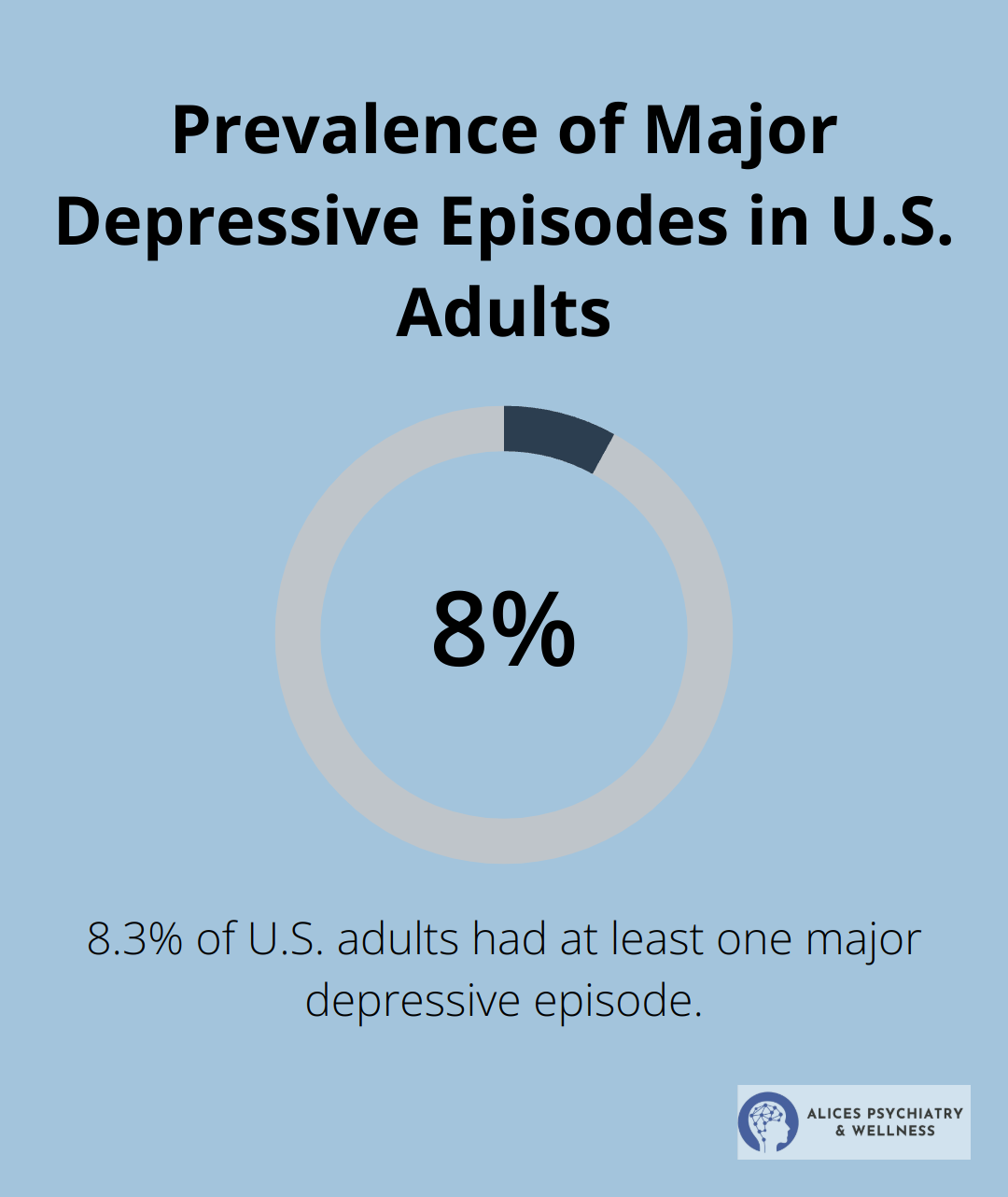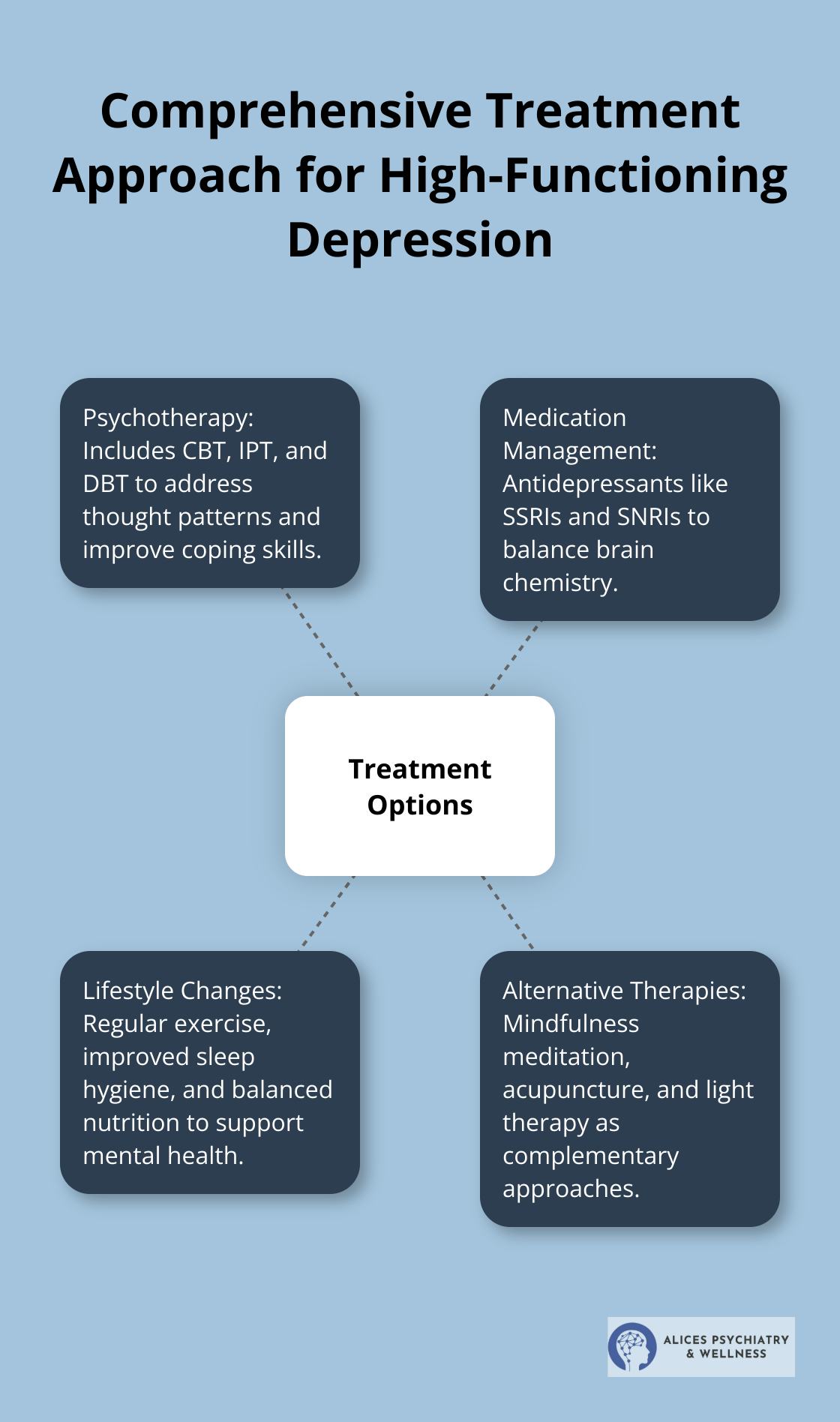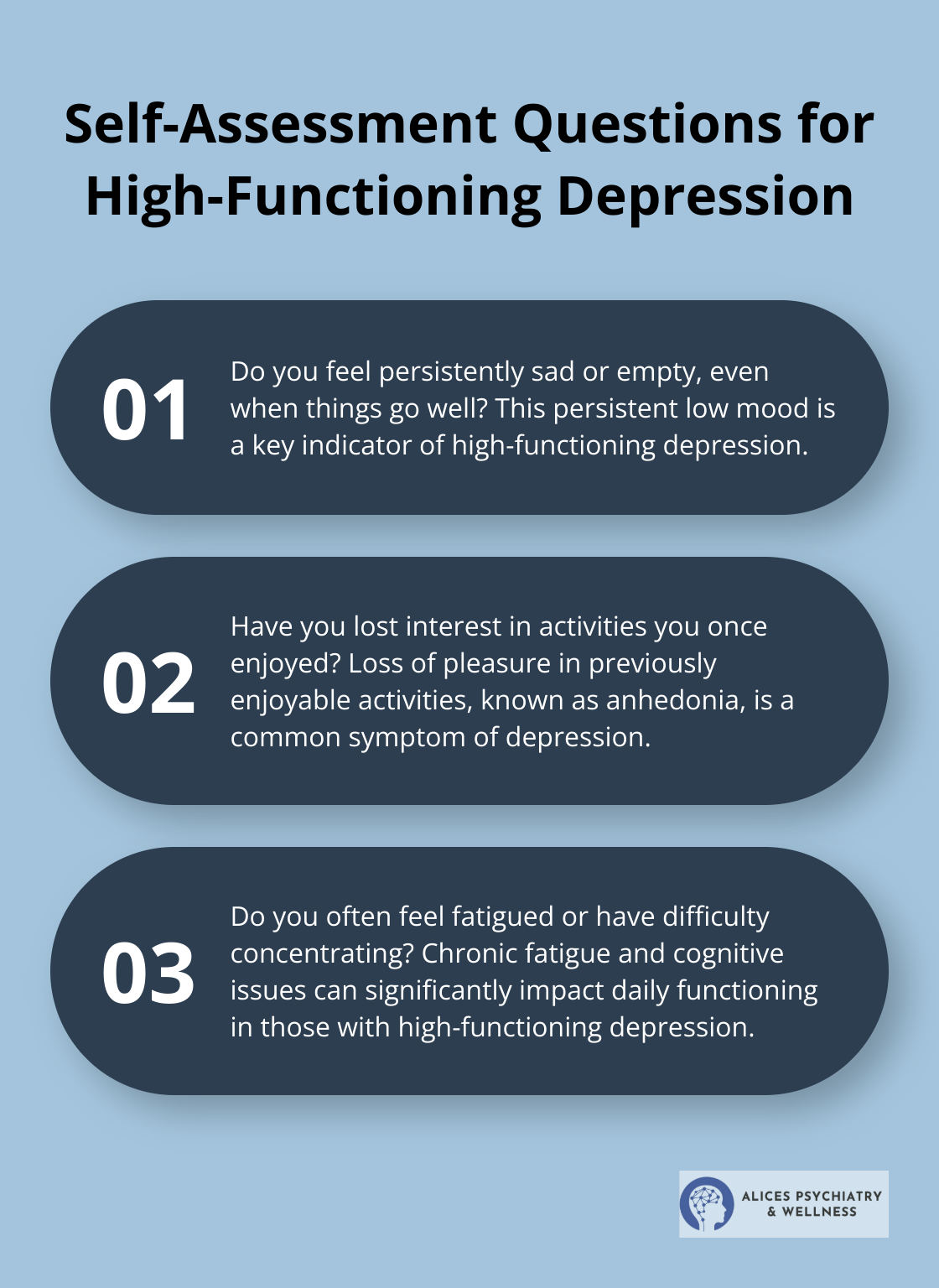High-functioning depression often goes unnoticed, masking its impact on daily life. Many individuals struggle silently, unaware that effective treatment for high-functioning depression exists.
At Alice’s Psychiatry and Wellness, we understand the challenges of managing this condition while maintaining a seemingly normal exterior. This blog post explores practical strategies and professional interventions to help those affected reclaim their mental well-being.
What Is High-Functioning Depression?
The Hidden Struggle
High-functioning depression, also known as persistent depressive disorder (PDD), often escapes notice. Unlike major depressive disorder, individuals with PDD maintain their daily responsibilities while experiencing chronic sadness or loss of interest over an extended period.
People with high-functioning depression appear successful externally, sustaining careers, relationships, and social lives. However, they battle persistent feelings of emptiness, low self-esteem, and a lack of joy in previously enjoyable activities. This disconnect between outward appearance and inner turmoil complicates recognition of the need for help, both for individuals and their loved ones.
Recognizing the Signs
Identification of high-functioning depression presents challenges, but several telltale signs exist:
- Persistent low mood or sadness
- Difficulty with concentration or decision-making
- Changes in sleep patterns or appetite
- Fatigue or low energy
- Feelings of hopelessness or pessimism
- Irritability or restlessness
If you experience two or more of these symptoms for at least two years, consider seeking professional help. A comprehensive evaluation can accurately diagnose and treat high-functioning depression.
The Impact on Daily Life
While individuals with high-functioning depression maintain their responsibilities, the condition significantly affects their quality of life. An estimated 8.3% of all U.S. adults had at least one major depressive episode. This statistic represents millions struggling silently with a condition that depletes their energy, diminishes their self-worth, and steals life’s pleasures.

The chronic nature of high-functioning depression can result in long-term health consequences if left untreated. Research indicates that untreated depression increases the risk of developing other mental health issues and physical health problems (including heart disease and weakened immune function).
Breaking the Silence
Overcoming the stigma associated with seeking help presents one of the biggest challenges in addressing high-functioning depression. Many individuals fear perception as weak or incapable if they admit to mental health struggles. However, seeking help demonstrates strength, not weakness.
Creating a safe, non-judgmental space for individuals to explore their feelings and develop effective coping strategies proves essential. A personalized approach ensures that each person receives the support and treatment they need to overcome high-functioning depression and rediscover joy in their lives.
The Path Forward
Understanding high-functioning depression marks the first step towards effective treatment. The next chapter will explore various treatment options, including psychotherapy approaches, medication management, and lifestyle changes that can help individuals manage their symptoms and improve their overall well-being.
Tailored Treatments for High-Functioning Depression

Psychotherapy: The Foundation of Recovery
Cognitive Behavioral Therapy (CBT) stands out as a highly effective treatment for high-functioning depression. This approach helps individuals identify and challenge negative thought patterns, replacing them with more balanced perspectives. Studies show that CBT can reduce depressive symptoms by up to 50% in 12 to 16 weeks.
Interpersonal Therapy (IPT) focuses on improving relationships and communication skills, which often suffer in those with high-functioning depression. This method has shown similar efficacy to CBT, with about 70% of patients experiencing significant improvement after 12-16 weeks of treatment.
Dialectical Behavior Therapy (DBT) combines elements of CBT with mindfulness techniques. While originally developed for borderline personality disorder, DBT has shown promise in treating persistent depressive symptoms, especially in individuals who haven’t responded well to other therapies.
Medication Management: A Powerful Tool
Antidepressants play a significant role in treating high-functioning depression. Selective Serotonin Reuptake Inhibitors (SSRIs) are often the first-line medication choice due to their effectiveness and relatively mild side effect profile. Studies indicate that about 40-60% of patients with depression respond positively to SSRIs within 6-8 weeks.
For those who don’t respond to SSRIs, other options include Serotonin-Norepinephrine Reuptake Inhibitors (SNRIs) or atypical antidepressants. It’s important to note that finding the right medication often requires patience and close collaboration with a psychiatrist.
Pharmacogenetic testing can help determine which medications might work best based on an individual’s genetic makeup. This advanced approach can significantly reduce the trial-and-error process often associated with finding the right medication.
Lifestyle Changes: The Power of Daily Habits
Exercise has proven to be a powerful tool in managing depression. A study published in the American Journal of Psychiatry found that just one hour of exercise per week can prevent 12% of future cases of depression. Try to engage in at least 30 minutes of moderate exercise five days a week.
Sleep hygiene is another important factor. Establishing a consistent sleep schedule and creating a relaxing bedtime routine can significantly improve mood and energy levels. The National Sleep Foundation recommends 7-9 hours of sleep per night for optimal mental health.
Nutrition also plays a vital role. A diet rich in omega-3 fatty acids (found in fish, nuts, and seeds) has been linked to lower rates of depression. Additionally, reducing alcohol and caffeine intake can help stabilize mood and improve sleep quality.
Alternative Therapies: Complementing Traditional Approaches
Mindfulness meditation has gained significant traction in mental health treatment. A study in the Journal of Consulting and Clinical Psychology found that Mindfulness-Based Cognitive Therapy (MBCT) reduced the risk of depression relapse by 43% in individuals with recurrent depression.
Acupuncture, while still considered an alternative therapy, has shown promise in treating depression symptoms. A meta-analysis published in the Journal of Affective Disorders found that acupuncture, when used in conjunction with antidepressants, can enhance the effect of medication treatment.
Light therapy, traditionally used for Seasonal Affective Disorder, has also shown benefits for non-seasonal depression. Exposure to bright light for 30 minutes each morning can help regulate mood and sleep patterns.
The Importance of a Comprehensive Approach
A comprehensive approach to treating high-functioning depression often yields the best results. This may include a combination of psychotherapy, medication management, lifestyle changes, and alternative therapies. Working closely with a mental health professional to develop a personalized treatment plan is essential for long-term success.
As we move forward, it’s important to address the barriers that often prevent individuals from seeking help for high-functioning depression. The next chapter will explore these obstacles and provide strategies for overcoming them, empowering more people to take the first step towards recovery.
Breaking Barriers to Mental Health Care
Recognizing the Need for Help
High-functioning depression often escapes notice, which makes it difficult for individuals to seek help. The National Institute of Mental Health reports that only 65% of adults with major depression receive treatment. This percentage likely drops for those with high-functioning depression due to its subtle nature.
To determine if you need help, ask yourself these questions:

If you answer yes to two or more of these questions and have felt this way for over two weeks, consider professional help.
Overcoming Stigma and Misconceptions
Stigma remains a significant barrier to seeking mental health treatment. Higher anticipated stigma can lead to increased internalized stigma, which is associated with decreased treatment seeking.
To combat this:
- Educate yourself about high-functioning depression. Knowledge can help dispel myths.
- Share your experiences with trusted friends or family members. This can normalize conversations about mental health.
- Seeking help demonstrates strength, not weakness.
Selecting the Right Healthcare Provider
The choice of mental health professional is vital for effective treatment. The American Psychiatric Association suggests considering the following when selecting a provider:
- Credentials and specialization in treating depression
- Treatment approaches and their alignment with your preferences
- Availability and accessibility of appointments
- Insurance coverage and cost of treatment
Alice’s Psychiatry and Wellness offers virtual appointments across several states, which ensures accessible, high-quality care from the comfort of your home. Our team specializes in treating various mental health conditions (including high-functioning depression).
Creating a Support Network
A strong support network can significantly impact your mental health journey. The Journal of Clinical Psychology reports that social support can reduce depression symptoms and improve treatment outcomes.
To build your support network:
- Identify supportive friends and family members
- Join a support group for individuals with depression
- Engage in community activities or volunteer work to connect with others
- Use online forums and communities for additional support
Final Thoughts
High-functioning depression presents unique challenges, but effective treatments exist. Psychotherapy, medication management, and lifestyle changes offer powerful tools to combat this condition. Alternative therapies like mindfulness meditation and acupuncture can enhance traditional approaches, providing a comprehensive strategy for mental wellness.
Recognizing the need for help marks the first step in addressing high-functioning depression. Overcoming stigma and misconceptions about mental health empowers individuals to seek the support they need. Selecting the right healthcare provider and building a strong support network play vital roles in the recovery process.
Alice’s Psychiatry and Wellness offers personalized treatment for high-functioning depression, utilizing advanced methods to optimize your care. Our team of experienced mental health professionals provides compassionate support to help you reclaim your mental well-being. Don’t wait to take the first step towards recovery – your journey to improved mental health starts today.





